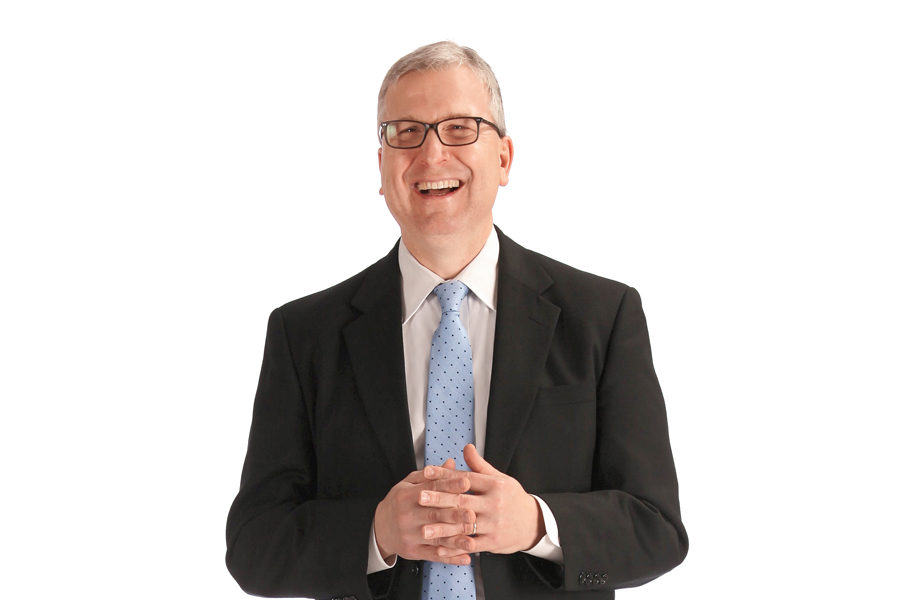
During his twenty-five years at Weill Cornell Medicine, Dr. John Leonard, the Richard T. Silver Distinguished Professor of Hematology and Medical Oncology, has been motivated by the same driving force: delivering the best possible treatments and cures to his patients. Moved by this incredible devotion and commitment, hundreds of Dr. Leonard’s patients have been inspired to support his groundbreaking work in blood cancer research as well as other priorities throughout the institution, donating millions of dollars. With this strong philanthropic foundation and a team of world-class physician-scientists by his side, Dr. Leonard, also the associate dean for clinical research, the associate director of clinical trials at the Meyer Cancer Center and the director of the Joint Clinical Trials Office at Weill Cornell Medicine and NewYork-Presbyterian, leads one of the top lymphoma research programs in the country.
He recently sat down with Larry Schafer, vice provost of external affairs, to speak about the impact of philanthropy on scientific discovery at Weill Cornell Medicine.
LS: You’ve been at Weill Cornell Medicine for a long time now – when you first came to this institution to do your internship and residency, did you immediately focus on cancer care?
JL: I had worked in college in a laboratory that was focused on stem cell biology and bone marrow, and so I already had that orientation. As I went through residency, I was deciding between hematology-oncology and infectious disease and at one time, I even considered doing both. Ultimately, I decided that much like when penicillin and other antibiotics were first introduced in the field of infectious disease, there was a steep curve ahead for the field of oncology – exciting things were on the horizon. And that has proven to be true.
LS: And how has it been to spend your entire medical career at Weill Cornell Medicine?
JL: It’s been a great place for me. It’s a place where people really work together to do the right thing and accomplish similar goals. I think that what makes Weill Cornell unique is that it’s a big enough place to get things done, but not so big that projects get stuck with too much red tape. We’re right at the sweet spot. I don’t think that my team could be doing our work any better at any other institution.
LS: During your time here, how have you seen the institution directly benefit from philanthropic support?
JL: Well, philanthropy has obviously contributed to the success of our institution, but even more important, it has contributed to our success in solving problems. I think it really comes down to rounding out where our funding is coming from. Funding that comes from the federal government is limited and challenging because it doesn’t always adequately support our projects – you’re getting by on a shoestring. The pharmaceutical industry does great things, and is a huge supporter of biomedical research and a critical partner, but there are some scientific questions that are not a priority for that industry. So philanthropy and direct support to an institution like ours is central – not only for funding specific studies, but for building infrastructure and core needs – like a database or a biobank. Philanthropy is helping to put the pieces in place and underpinning so many of our efforts.
LS: Your expertise in patient care and treatment has been so motivational to so many of your patients – you have truly changed people’s lives. How do you inspire your patients to support our efforts?
JL: I really enjoy talking to patients and engaging them in our projects. Often, they ask great questions that we haven’t thought of – or maybe we haven’t prioritized – because we’re only looking at it from one angle. I’m constantly amazed by my patients who donate at any level. I get surprised every day with a $100 or $1,000 check in the mail – and I think it’s because they want to help and they appreciate that we’re there for them. Our patients feel loyalty to our institution.
LS: It sounds like you have inspired your patients to give, but they have also inspired you…
JL: When you see people struggle with challenges, you really learn how strong the human spirit is. And, when you’re treating patients with disease, you see that in a very direct way. I continue to be inspired by my patients – spending time talking to them, and understanding them, is my favorite thing to do.
LS: As the director of the Joint Clinical Trials Office, you have a front row seat for some of the truly incredible work that is being done across the institution. Why do you think clinical trials are so important for advancing treatments and cures for patients?
JL: Anytime I sit with a patient, or any doctor sits with a patient, and they explain the benefits of the different treatment options or suggest a standard therapy, it’s because somebody, somewhere, participated in a clinical trial; a patient was brave enough and dedicated enough – and optimistic enough – to go on a clinical trial to answer that question and hopefully helped themselves and other people. I love treating the patients that are in front of me, but I also want to help the patients that I’ll never meet and never see. I think that’s a key part of an academic institution – to have a much broader impact beyond our walls – and clinical trials are one significant way to do that.
